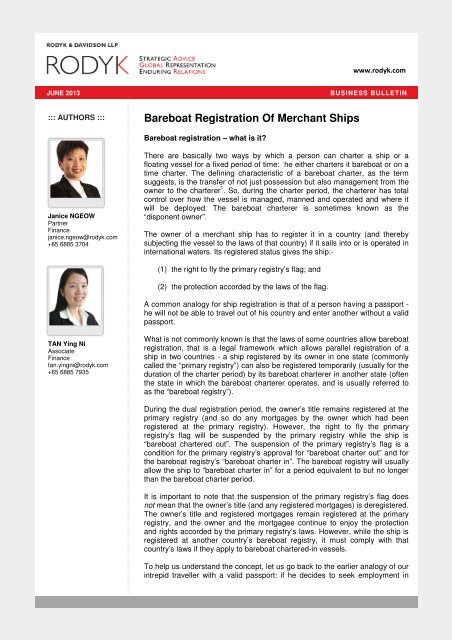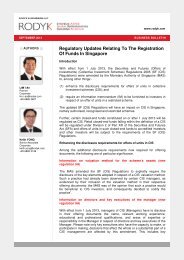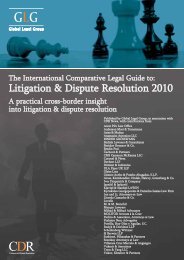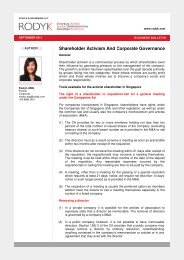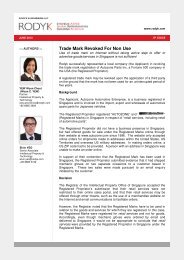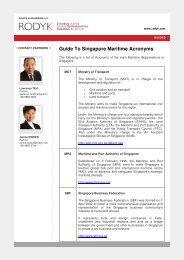Bareboat Registration Of Merchant Ships - Singapore Law Watch
Bareboat Registration Of Merchant Ships - Singapore Law Watch
Bareboat Registration Of Merchant Ships - Singapore Law Watch
Create successful ePaper yourself
Turn your PDF publications into a flip-book with our unique Google optimized e-Paper software.
www.rodyk.com<br />
JUNE 2013<br />
BUSINESS BULLETIN<br />
::: AUTHORS :::<br />
<strong>Bareboat</strong> <strong>Registration</strong> <strong>Of</strong> <strong>Merchant</strong> <strong>Ships</strong><br />
<strong>Bareboat</strong> registration – what is it?<br />
Janice NGEOW<br />
Partner<br />
Finance<br />
janice.ngeow@rodyk.com<br />
+65 6885 3704<br />
There are basically two ways by which a person can charter a ship or a<br />
floating vessel for a fixed period of time: he either charters it bareboat or on a<br />
time charter. The defining characteristic of a bareboat charter, as the term<br />
suggests, is the transfer of not just possession but also management from the<br />
owner to the charterer 1 . So, during the charter period, the charterer has total<br />
control over how the vessel is managed, manned and operated and where it<br />
will be deployed. The bareboat charterer is sometimes known as the<br />
“disponent owner”.<br />
The owner of a merchant ship has to register it in a country (and thereby<br />
subjecting the vessel to the laws of that country) if it sails into or is operated in<br />
international waters. Its registered status gives the ship:-<br />
(1) the right to fly the primary registry’s flag; and<br />
(2) the protection accorded by the laws of the flag.<br />
A common analogy for ship registration is that of a person having a passport -<br />
he will not be able to travel out of his country and enter another without a valid<br />
passport.<br />
TAN Ying Ni<br />
Associate<br />
Finance<br />
tan.yingni@rodyk.com<br />
+65 6885 7935<br />
What is not commonly known is that the laws of some countries allow bareboat<br />
registration, that is a legal framework which allows parallel registration of a<br />
ship in two countries - a ship registered by its owner in one state (commonly<br />
called the “primary registry”) can also be registered temporarily (usually for the<br />
duration of the charter period) by its bareboat charterer in another state (often<br />
the state in which the bareboat charterer operates, and is usually referred to<br />
as the “bareboat registry”).<br />
During the dual registration period, the owner’s title remains registered at the<br />
primary registry (and so do any mortgages by the owner which had been<br />
registered at the primary registry). However, the right to fly the primary<br />
registry’s flag will be suspended by the primary registry while the ship is<br />
“bareboat chartered out”. The suspension of the primary registry’s flag is a<br />
condition for the primary registry’s approval for “bareboat charter out” and for<br />
the bareboat registry’s “bareboat charter in”. The bareboat registry will usually<br />
allow the ship to “bareboat charter in” for a period equivalent to but no longer<br />
than the bareboat charter period.<br />
It is important to note that the suspension of the primary registry’s flag does<br />
not mean that the owner’s title (and any registered mortgages) is deregistered.<br />
The owner’s title and registered mortgages remain registered at the primary<br />
registry, and the owner and the mortgagee continue to enjoy the protection<br />
and rights accorded by the primary registry’s laws. However, while the ship is<br />
registered at another country’s bareboat registry, it must comply with that<br />
country’s laws if they apply to bareboat chartered-in vessels.<br />
To help us understand the concept, let us go back to the earlier analogy of our<br />
intrepid traveller with a valid passport: if he decides to seek employment in
www.rodyk.com<br />
JUNE 2013<br />
BUSINESS BULLETIN<br />
another country, he has to apply for a temporary work permit to work in the<br />
foreign country. However, his nationality (i.e. the primary registry of a ship) is<br />
not revoked. His work permit (i.e. the bareboat registration at the foreign<br />
country) will only be valid as long as he has a job in that country (i.e. if a ship,<br />
as long as the ship is on bareboat charter).<br />
Although there are no international conventions or laws governing bareboat<br />
registration, it is subject to reciprocity and compatibility of the respective laws<br />
of the primary registry state and bareboat registry state. Both states’ laws<br />
should at least recognise that:-<br />
(1) the laws of the primary registry will exclusively apply to the ship’s title<br />
and mortgages, and the order of priority of any security interest in the<br />
vessel;<br />
(2) while the laws of the bareboat registry state (whose flag the ship flies)<br />
will exclusively regulate the operation (e.g. crewing, manning,<br />
licensing and safety) of the ship.<br />
In some countries, the primary registry is known as the “flagging out state”,<br />
and the bareboat registry the “flagging in state”. In the authors’ view, the terms<br />
are not quite right because during the dual registration period, the vessel can<br />
only fly the flag of the bareboat registry; the flag of the primary registry is<br />
suspended.<br />
Cabotage jurisdictions<br />
Cabotage refers to the domestic trade by ships conducted between ports of<br />
the same country. Cabotage jurisdictions which adhere to the cabotage<br />
principle generally allow only vessels flying their country’s flag to engage in<br />
domestic trade in its territorial waters.<br />
Alternatively, a cabotage jurisdiction may impose less favourable tax rates on<br />
foreign flags.<br />
Many of these countries install a bareboat registry as a convenient legal<br />
solution to overcome a shortage of merchant ships. The bareboat registry also<br />
allows a country to expand their fleet to meet temporary domestic shipping<br />
demands.<br />
Examples of countries with cabotage policies in place are our immediate<br />
neighbours Malaysia and Indonesia. Other cabotage jurisdictions in the<br />
Association of Southeast Asian Nations, such as the Philippines and Vietnam,<br />
are allowing flagging-in or taking baby steps to relax their policies. Even<br />
though <strong>Singapore</strong> has no cabotage restrictions, it has a well-established<br />
bareboat registration regime.<br />
The <strong>Singapore</strong> <strong>Bareboat</strong> Registry<br />
<strong>Bareboat</strong> charter in<br />
The <strong>Singapore</strong> Ship Registry (the Registry) allows the registration of bareboat<br />
charter ships.
www.rodyk.com<br />
JUNE 2013<br />
BUSINESS BULLETIN<br />
A foreign vessel may be registered in <strong>Singapore</strong> if it is chartered on bareboat<br />
charter terms to a charterer who is qualified to own <strong>Singapore</strong> ships (i.e. must<br />
be a citizen of or a body corporate incorporated in <strong>Singapore</strong>) and its primary<br />
registry is closed/suspended. Further, if the bareboat charterer is a company<br />
and is not the registered owner of any <strong>Singapore</strong> ship, the bareboat charterer<br />
must have a minimum paid-up capital of $50,000 in order for the bareboat<br />
charter ship to qualify for registration.<br />
<strong>Bareboat</strong> charter out<br />
For the vessel to be bareboat chartered out of <strong>Singapore</strong>, the vessel’s<br />
<strong>Singapore</strong> registry has to be suspended for the duration of the charter period.<br />
While the <strong>Singapore</strong> registry is suspended, the provisions of the <strong>Merchant</strong><br />
Shipping Act and its regulations will cease to apply to the vessel except:- 2<br />
(1) the provisions relating to mortgages and property in the vessel in Part<br />
II of the Act;<br />
(2) the provisions relating to the vessel’s register; and<br />
(3) the provisions relating to the continued payment of the vessel’s annual<br />
tonnage tax.<br />
Treatment of mortgages<br />
When a shipowner’s acquisition of the ship is financed by a bank or financial<br />
institution, more often than not a mortgage will have to be created over the<br />
ship. The financier should ensure that its mortgage is registered in a primary<br />
registry with a well established and effective legal system. If the vessel has to<br />
be bareboat chartered and flagged in another country, the financier should<br />
also ensure that the bareboat registration will not prejudice or jeopardise its<br />
mortgage in any way. A prudent financier will want to satisfy itself that its<br />
mortgage is not only enforceable in the state of its primary registry but also in<br />
the bareboat registry state.<br />
It would be a bonus for the mortgagee if the flagging state’s registry’s rules<br />
allow for the “recording” of mortgages created by the shipowner. Such a<br />
facility will enable outsiders (who check the bareboat registry) to have notice of<br />
the existence of an existing mortgage on the vessel. Invariably, the bareboat<br />
registries who do have such a facility will allow only mortgages already<br />
registered in the relevant primary registry to be recorded.<br />
The <strong>Singapore</strong> <strong>Bareboat</strong> Registry unfortunately does not provide for<br />
recordation of mortgages registered in the primary registry of the vessel. It<br />
also does not require any evidence of consent from the primary registry<br />
mortgagee.<br />
In contrast, leading bareboat chartering in jurisdictions such as Liberia,<br />
Panama, Marshall Islands and the Philippines allow some form of recordation<br />
or annotation of mortgages, which are recorded in the primary registry of the<br />
vessel, in the relevant bareboat charter register to serve as notice to third<br />
parties. Additionally, these jurisdictions require consent from the mortgagees<br />
for flagging in, thereby preventing the ship owner from changing the flag of the
www.rodyk.com<br />
JUNE 2013<br />
BUSINESS BULLETIN<br />
RODYK & DAVIDSON LLP<br />
SINGAPORE<br />
80 Raffles Place<br />
#33-00 UOB Plaza 1<br />
<strong>Singapore</strong> 048624<br />
Tel +65 6225 2626<br />
Fax +65 6225 1838<br />
Email mail@rodyk.com<br />
vessel without consent from the mortgagees (though, there would invariably be<br />
an undertaking from the ship owner to not change the flag of the vessel).<br />
1 As opposed to a voyage charter (i.e. the vessel is chartered for a particular voyage) or a time<br />
charter (i.e. the vessel is chartered for a set period of time) where the owner of the vessel<br />
retains possession of the vessel.<br />
2 <strong>Merchant</strong> Shipping (<strong>Registration</strong> of <strong>Ships</strong>) Regulations reg 35<br />
SHANGHAI<br />
Unit 23-11 Ocean Towers<br />
No. 550 Yan An East Road<br />
Shanghai 200001, China<br />
Tel +86 (21) 6322 9191<br />
Fax +68 (21) 6322 4550<br />
Email shanghai.mail@rodyk.com<br />
Rodyk Reporter June 2013<br />
This article is for general information purposes only. Its contents are not intended to be legal or professional advice and are not a substitute for<br />
specific advice relating to particular circumstances. Rodyk & Davidson LLP does not accept responsibility for any loss or damage arising from any<br />
reliance on the contents of this article. If you require specific advice or have any questions, please contact the author(s) or our Editor.<br />
© Rodyk & Davidson LLP 2013. Limited Liability Partnership <strong>Registration</strong> No. T07LL0439G.


